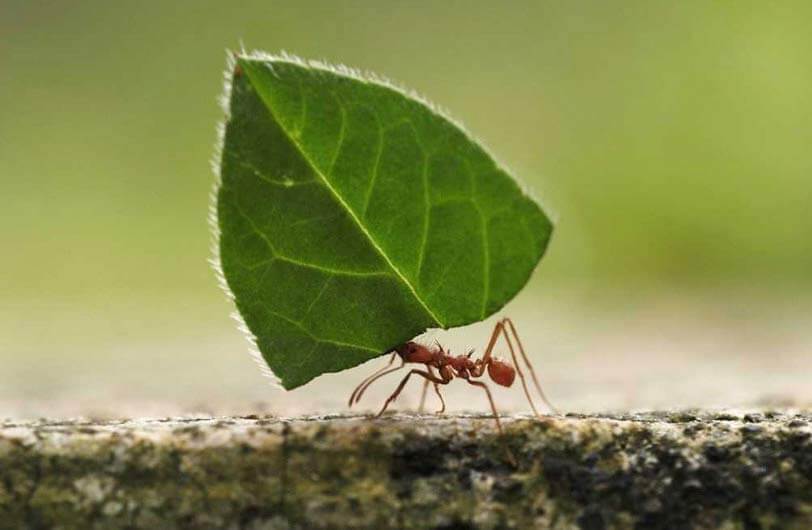The question of how much an ant weighs1 has been wondered by many. Depending on their species and size, the weight of an ant becomes more surprising after knowing that they can hold weights that are multiple times more than their body mass.
The most common ant species can weigh between 5 to 10 milligrams. However, other species can also weigh over 150 milligrams.
For an ant queen, whose job is to lay eggs and to take care of the colony, their weight can fall somewhere between 15 milligrams to 30 milligrams.

How much weight can an ant carry?
Although there have been many estimates, biologists say that ants can carry items that are 10-50 times their body weight, and sometimes this can even go higher.
Ants can do this because even though their bodies are tiny, they are equipped with muscles that have a greater cross-sectional area relative to their body size than those of larger animals. This means that they can produce more force.
Aside from that, the bodies of ants are built to bear a lot more force, if there is a need to. Studies reveal that their joints can withstand forces that are 3,000 times more compared to their own body weight.
Since ants live in complex colonies, it is crucial for their survival to fulfill their specialized role. Worker ants need to have super strength since they need to carry items back to their colony.
Worker ants are also responsible for digging tunnels to expand their colony, to maintain it, to give care to the queen’s offspring, and to search for food.
Which species of ants is the largest?
Among all species of ant present in the world, the largest ant in the world is the Giant Amazonian which can achieve an impressive length of 1.6 inches.
The Giant Amazonian species can only be found in South America, particularly in both the coastal and rainforest regions. The female species have a jet-black color, and the male species are of a dark red color.
When threatened, these species can become territorial even when faced with other ants. They commonly settle their colonies in the soil and do not stray much further from their source of food and sustenance.
Their diet includes a variety of plants, including other small animals and insects such as snails, spiders, and crickets.
Which species of ants is the smallest?
The Carebara atoma ant species is believed to be one of the world’s smallest ant species, with their minor workers sized just about 1 millimeter long.
It is also believed that dozens of colonies of this ant species can fit inside the braincase of the world’s largest ant species.
Although there are other relatively smaller ant species, any ant that is 2 millimeters in length is considerably a small ant, even with consideration that they are already an ant. These types of species can be difficult enough to inspect with the naked eye.
What is the weight of all ants on earth?
Understanding the answer to this question means acknowledging that there are 15,700 species and subspecies of ants around the world, with some of them not yet named. With that, it can be hard to estimate how much there is crawling on the planet.
However, research indicates an estimate that there are 20 quadrillion ants on the planet.
Calculating the mass of organisms means measuring them in terms of their carbon makeup. With that, it is estimated that 20 quadrillion average-sized ants amount to a biomass of an estimated figure of 12 million tonnes of carbon.
This figure can come as more surprising especially when it is more than the combined dry weight of both wild birds and mammals or about 20% of the total human biomass.
What is the total weight of all ants versus humans?
As stated in an article by Harvard University professor Edward O. Wilson and German biologist Bert Hoelldobler, the weight of all ants in the world would weigh just as much as the total weight of all humans on the planet.
Although that study may have been true before, Hannah Moore critiqued that with the 7.2 billion humans today, the total weight would be about 332bn kg, which is not the same as the estimated weight of 40bn kg of 10,000 trillion ants.
Additionally, Francis Ratnieks, a professor from the University of Sussex that the study may not be as accurate if analyzed today. This can be debunked by acknowledging the massive population growth of humans in the past decades.
Why are ants important?
Ants are essential since they provide ecosystem services for humans and other animals. They also develop close interactions with other organisms, and there are some species that rely on them for survival.
For instance, there are species that depend on ants to flush out prey for food hunting, and there are hundreds of plants that either feed on ants or house them for sustenance and survival.
Consequently, there are also species of ants who are predators, which help keep populations of other insects in check and controlled.
Unfortunately, the population of ants has been declining due to the threat of fragmentation, habitat destruction, threat of invasive species, chemical use, and climate change.
Considering that ants play an important role in keeping ecosystems balanced and well-functioning, it is in our best interests to monitor and not threaten them. Although they are tiny compared to us, they hold a huge space in our survival.
- Kevin Jones, (2023) How Much Do Ants Weigh? <https://measuringly.com/how-much-do-ants-weigh/> Accessed: 06-03-2024



